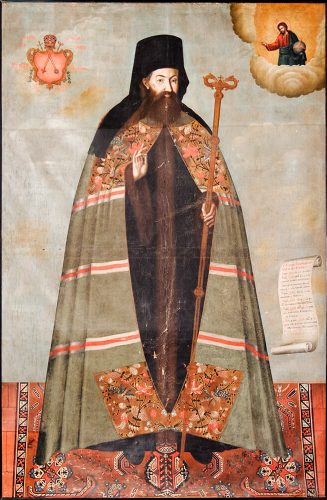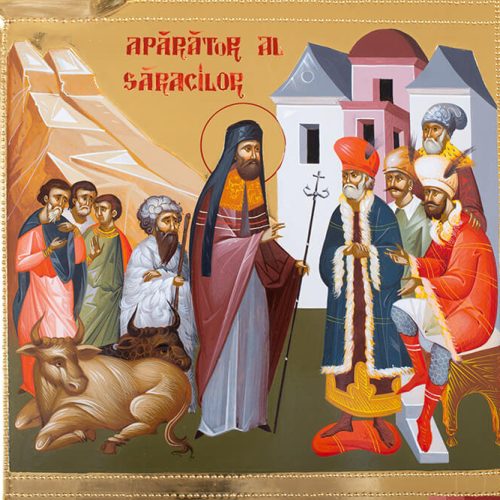
By God’s grace, and through the goodwill of Father Abbot Melchisedec of Putna Monastery, our monastery was adorned with a portion of holy relics from Saint Jacob of Putna. Therefore, we will continue presenting fragments from the life and spiritual heritage of this great saint.
Life of the Saint
Episcopacy. Saint Jacob was chosen abbot of Putna Monastery in 1744, when he was 25 years old. Yet his gifts and God’s dispensation for him shone beyond the monastery gates, such that one year later, in 1745, he was elected Bishop of Rădăuți. As bishop, he continued spreading the word of God by means of the books of his predecessor on the episcopal throne, Bishop Varlaam, and thus he quickly published a Slavonic-Romanian Liturgicon.
After just five years, his worthiness and zeal in serving God determined his elevation to the metropolitan throne of Moldavia. In November 1750, he was promoted to the highest episcopal rank in the country. During his 10 years as Metropolitan at Iași (1750–1760), he carried out many pastoral and social programs, he promoted Romanian culture and publishing houses, and he oversaw the translation of spiritually profitable books.
Showing mercy to the poor. One of the greatest acts of charity which he performed for his flock was his success in convincing the country’s rulers to eliminate several taxes that were impoverishing the entire country, but especially the lower class.
The Romanian Principalities were under the difficult period of Phanariot rule. To become lords, candidates had to pay great sums of money to the Ottoman Empire. Then, upon arriving in the Romanian Principalities, they instated burdensome taxes to cover the expenses they incurred while acquiring their lordship.
The heaviest tax was the “văcărit” – the tax on large livestock. This tax resulted in deep poverty through the country. Several times, the hierarchs managed to bind this tax with a curse, thereby prohibiting it. But, at the pressure of the political rulers, the curse was loosed and the livestock tax was reinstated. In 1756, Voivode Constantin Racoviță imposed it again. Saint Jacob advised and convinced him to give up on this tax. A chronicler of the time described Saint Jacob’s act and the severity of the livestock tax:
“Being persuaded by divine zeal and by the spiritual guidance of His Eminence Jacob, the Metropolitan of Moldavia, and understanding that all the evil and deterioration of this country has no other cause, except for that corrupting and ugly tax, which even if none of the country’s inhabitants had cows anymore, they all still had to pay. And in those days, even a poor widow, who spins flax to earn her food and livelihood, was required to give money for the livestock tax.”
Saint Jacob and the other hierarchs were joined by the country’s noblemen and, together, they requested and obtained an anathema from the Patriarch of Constantinople against those who will reinstate this tax.
The religious ceremony of binding the curse over the livestock tax was impressive. Voivode Constantin Racoviță summoned 6 inhabitants from each commune to Iași. Together with them, many people came from the city and its surroundings. They all gathered in the Metropolitan Cathedral and precinct. During the Divine Liturgy, at the Great Entrance, Saint Jacob read aloud the Patriarchal Anathema, and the multitudes responded with “Amen!” to each clause. The chronicler Enache Kogălniceanu, who maintained good order at the service, wrote: “we cannot portray the roar in the church from the yelling of the people”. Then followed the reading of another anathema, signed by the Metropolitan, the bishops, and the abbots of the large monasteries.

In the years following the removal of this tax, the country flourished because families had been freed from the burden of poverty. The removal of the tax allowed families to have more children, as they were no longer terrified of not having enough means to provide for them: “as soon as this tribute was lifted, the inhabitants were strengthened and began to multiply, and from then the state of affairs was rectified”.
But Saint Jacob needed to continue fighting to preserve this victory. In 1758, the Turks named Ioan Teodor Callimachi as lord. The new lord adamantly insisted that Saint Jacob unbind the curse. Ultimately in 1760, after two years of pleas, Saint Jacob resigned from his metropolitan throne to prevent a crisis from afflicting the country. He delivered a moving speech:
“Behold, I’ve relinquished the Metropolitanate and the honor and every earthly things, lest I receive the fire of the curse upon my head and in my soul; and consider yourselves as guests in this world, and contemplate that in the next world we will live and give an answer for our deeds, and be healthy”.
At these words, those present “lost it” and burst out crying. Not only them, but the entire nation, from aristocrats to simple people, wept bitterly at his resignation, because they knew that a great and holy shepherd was leaving them.
But his sacrifice was not in vain. Through it, the livestock tax was eliminated definitively. Despite receiving permission from the Patriarch of Constantinople to lift the anathema, no one dared to do so, not even the next Metropolitan, Gavriil Callimachi, even if he was the lord’s brother. In contrast to Moldavia, the livestock tax continued to be exacted in Wallachia for another 40 years.
So important was Saint Jacob’s opposition to the livestock tax, that the people composed two verses that portray this very act: “Jacob the Metropolitan / Who bound the livestock tax”.
(To be continued)
It is meet to rejoice only in the Lord
[…] Don’t rejoice in anything of this mournful and passing age, because everything belonging to it is instable and hypocritical, everything false and inconsistent. Rather, if you want console yourself, console yourself only in the Lord; if you want to rejoice, rejoice only in the Lord, because bodily joy perishes rapidly, whereas joy in the Lord remains eternally. Earthly consolation perishes rapidly and devolves into bitterness, whereas the consolation of the Most Holy Spirit in the Lord ever consoles and will console unto the ages of ages with ineffable consolation. For this, rejoice in none else except for the Lord, for the prophet says: “Rejoice in the Lord, all ye upright in heart”. And again, the Apostle says: “Rejoice always, pray constantly, give thanks for all things”, for in these is our salvation achieved. […]
Rejoice in the Lord and give thanks to Him, because even though you sin before him with darkness of darknesses, He mercifully receives you through repentance. How often do you sin before Him, and He never abandons you? How often do you transgress His commandments, and He never turns away from you? How often do you fall, and He lifts you up, He shows longsuffering towards you, He doesn’t condemn you to death, but He awaits unto the end, that maybe you will return? You were given a law, the knowledge of His will, He didn’t abandon you from baptism, He didn’t let you fall into another faith or to be swallowed up by the perdition of heresies.
Rejoice in the Lord and give thanks to Him, because in exchange for small pleasures, He promised to grant you eternal life in the Heavenly Kingdom, He Who made and fashioned and granted everything for our benefit. Not for some little time, not for some short time, not for a hundred years or for a thousand or for a million, but unto ages of ages without end. Glory to His unmeasurable mercies! Glory to His exceedingly wise caring guidance. Glory to His ineffable and boundless kindness and love for mankind, for to Him is due all glory, honor, and dominion, together with His Father Who is without beginning, and with His all-holy, good, and life-giving Spirit, now and ever and unto the ages of ages. Amen!
(Alfavita sufletească, Iași, 1755)
